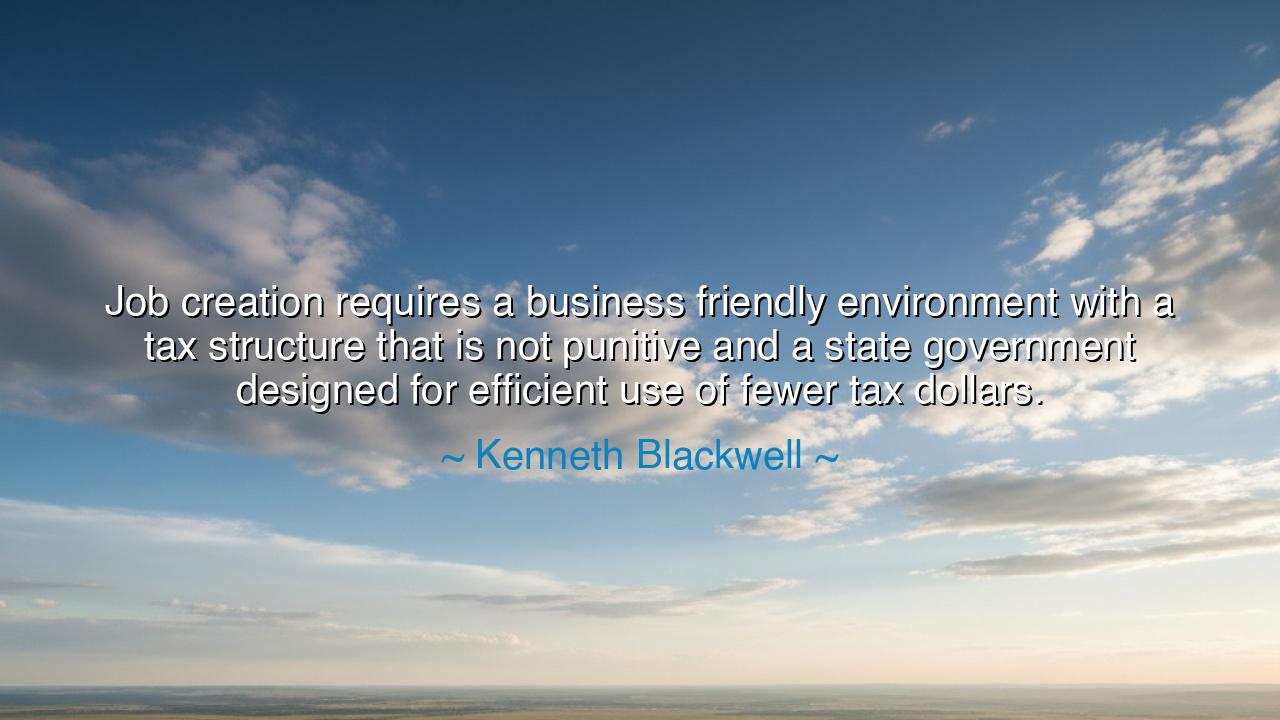
Job creation requires a business friendly environment with a tax
Job creation requires a business friendly environment with a tax structure that is not punitive and a state government designed for efficient use of fewer tax dollars.






Hearken, children of enterprise and prudence, and attend the words of Kenneth Blackwell, a voice attuned to the rhythms of prosperity and civic stewardship: “Job creation requires a business friendly environment with a tax structure that is not punitive and a state government designed for efficient use of fewer tax dollars.” In this declaration lies a meditation upon the interplay of governance, commerce, and human endeavor, revealing that the fertile soil of employment is tilled not by chance, but by thoughtful structures that honor both innovation and public stewardship.
Blackwell speaks to the eternal truth that labor springs from opportunity. Business, like a mighty river, requires channels through which it may flow freely. When governments burden enterprise with punitive taxation, excessive regulation, or inefficiency, the river slows, stagnates, and fails to nourish the lands it passes. Conversely, when governance respects efficiency, accountability, and fair treatment, commerce flourishes, and employment—the lifeblood of society—expands. Blackwell’s insight is a timeless recognition that prosperity cannot be imposed; it must be enabled by wise stewardship.
History offers a mirror to this wisdom. Consider the industrious cities of the northern Italian Renaissance, where city-states like Florence and Venice cultivated trade through measured taxation, protection of property, and the encouragement of artisans and merchants. These policies did not merely enrich the state coffers; they created work, fostered innovation, and elevated the standard of living. Here, the principle is clear: a business-friendly environment, tempered by prudent governance, transforms talent and ambition into the engine of society.
Yet Blackwell’s words are not solely about commerce; they are a meditation on responsible government. Efficiency in the use of tax dollars is more than fiscal prudence—it is a moral duty. Every coin collected is the fruit of labor, and every misused dollar diminishes trust, erodes opportunity, and constrains the potential for growth. Governance, when aligned with purpose, becomes a partner to enterprise rather than a burden, allowing citizens to convert ambition into action and ideas into livelihoods.
Consider the modern example of Singapore, a city-state that transformed from a struggling port to a thriving hub of trade and industry. Through deliberate policies fostering low taxes, streamlined bureaucracy, and targeted investment, the state created a climate where entrepreneurship flourished and jobs multiplied. Blackwell’s counsel resonates here: the environment shaped by government determines the scale of opportunity, and efficiency in administration is the silent engine of employment and societal well-being.
The lesson, therefore, is that job creation is neither accidental nor purely the province of private ambition; it is the fruit of a symbiotic relationship between governance and enterprise. Citizens thrive when governments respect the principles of fairness, efficiency, and strategic stewardship, and businesses flourish when opportunity is not stifled by punitive measures or needless complexity. Prosperity is cultivated where policy and initiative meet in harmony.
Practical actions flow from this reflection: advocate for transparent, fair, and efficient government policies; support tax structures that encourage innovation and expansion; understand how regulation affects local businesses; and, whether as a citizen or entrepreneur, recognize that active engagement in civic and economic life shapes the environment in which opportunity grows. In this way, each individual becomes a steward of both commerce and community.
Thus Blackwell’s words echo like a clarion across generations: job creation is born not from idle hope but from a deliberate, enlightened environment, where government serves as both guide and facilitator, and business as the instrument of human creativity. Let this wisdom remind every citizen and leader that employment, prosperity, and social well-being are the fruits of governance that respects efficiency, fairness, and the boundless potential of human enterprise.
If you wish, I can craft an even more heroic, evocative version, with epic cadence and rhythm, emphasizing the moral and civic weight of Blackwell’s insight for dramatic narration. Do you want me to do that?






AAdministratorAdministrator
Welcome, honored guests. Please leave a comment, we will respond soon